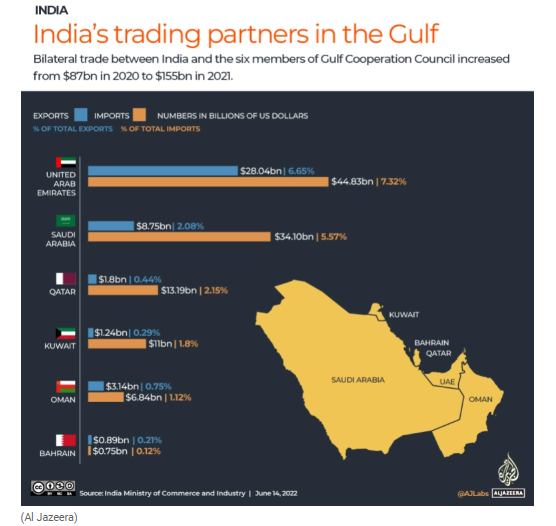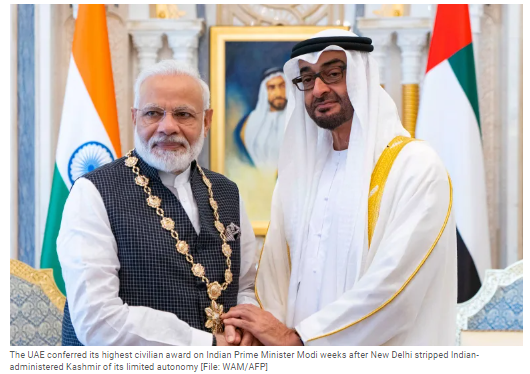Disrespectful remarks made by India’s ruling Bharatiya Janata Party (BJP) government officials against Prophet Muhammad ﷺ have sparked widespread condemnation from Arab countries, especially the ones residing in the Persian Gulf region. Muslims have praised their united stance on this matter all over the world. However, should we celebrate this the way we are doing on social media? Because the Gulf countries have done a few questionable things in the past that put their current attitude into doubt. Moreover, is it going to affect India at all? Let’s find out.
What happened actually?
On May 26 2022, BJP spokeswoman Nupur Sharma made disrespectful and Islamophobic remarks about Prophet Mohammad ﷺ and his wife on an Indian news channel show. Soon social media started flooding with hashtags like “#BoycottIndiaProducts” and “#StopinsultingProphetMuhammad” which were trending on Twitter and Facebook feeds of many Gulf countries. Immediately afterward, Qatar, Kuwait, and Iran summoned India’s ambassadors and expressed their disapproval of such remarks, while the UAE and Saudi Arabia released statements of condemnation along with several other Muslim majority countries in the Gulf Cooperation Council (GCC) and Organisation of Islamic Cooperation (OIC). Qatar’s assistant foreign minister tweeted with strong words highlighting the “dangerous levels” of “Islamophobic discourse” in India. As reported by AFP, Kuwait took it a step further with its local supershops removing all Indian-made products from its shelves.
The Indian government readily went into damage control: they suspended the alleged spokeswoman who made the disparaging comments and expelled another leader for his tweets in defense of the BJP spokeswoman. India’s foreign ministry also released statements expressing that the remarks didn’t reflect the government’s position and were merely personal statements. BJP argued that the party was “against any ideology which insults or demeans any sect or religion.” and believed in the harmony between all religions. Several officials agreed that those derogatory remarks shouldn’t have been made.
Do Arab countries really care about Muslims in India?
Arab nations had remained silent in India’s countless reports of mistreatment of minorities over the years. India is the third-largest country with the Muslim population of almost 200 million. When nearly 2 million Muslims in Assam were surgically left out of the National Register of Citizens by the Citizenship Amendment Act of 2019 (an act that grants Indian citizenship to all minorities except Muslims), effectively making them stateless: no Arab voices were heard. When Muslims were marginalized politically and singled out to be the victims of violence over the simple matter of beef consumption and cow slaughter, an act considered a grave sin by the Hindu people, no Arab voices were raised in retaliation. Several prominent Hindu religious figures, many of whom have ties to the BJP, have called for the extermination of Muslims in recent months, but no action has been taken against them. There were clear violations of basic human rights in some of these cases tied up with religious sentiment. Yet, neither the gulf countries nor their organizations (GCC and OIC) made any remarks against India. In recent years, GCC nations have been relatively silent regarding India’s treatment of minorities. Prior to the Hindu right’s climb to power in 2014, they mainly refrained from commenting on what they saw as a domestic concern in India.
But you cannot remain silent that long after having several rights organizations like Amnesty International and Human Rights Watch warning against the rising Islamophobia in India and the patronizing role of the BJP party in propagating it. In January, Dr. Gregory Stanton, the founder and head of Genocide Watch, stated Assam and Indian-administered Kashmir had early “signs and processes” of genocide. Dr. Stanton was the one who predicted the Rwandan genocide of 1994 years before it happened. “What we are now facing is a very similar kind of a plot,” he said.
Why did India go into defensive mode?
It was an unprecedented event that India would sound apologetic in dealing with the international outcry over one of its internal matters. India, like China, has typically strongly objected to international criticism of its treatment of minorities, claiming that it is their internal matter. However, in this case, the stakes are too high for India to overlook and maintain the carefree attitude.
The Middle East is a crucial theatre of foreign relations for India. Gulf Cooperation Council or GCC is international body that seeks to promote regional, economic, and intergovernmental cooperation between the six states in the Persian Gulf region, namely Bahrain, Kuwait, Oman, Qatar, Saudi Arabia, and the United Arab Emirates. Trade between India and the GCC has grown, reaching $155 billion in 2021-22 compared to $87 billion the previous year. Oil and gas imports account for the majority of the trade, with New Delhi obtaining 60% of its petroleum supply from GCC nations. India annually receives more than $50 billion in remittances sent by more than 8 million Indians who work in the GCC countries. Indian enterprises have contributed to the gulf region’s economic growth over the years.

India’s options have been further limited by recent geopolitical and economic bilateral deals with Gulf states. For example, the United Arab Emirates, home to 3.5 million Indian expatriates. It accounts for 33% of remittances to India, totaling more than $20 billion each year. It is evident why UAE considers India as one of its valuable strategic and economic partners in the coming years. A free-trade deal between India and the UAE went into effect last May, removing tariffs on most of India’s exports to the Gulf states. Furthermore, the UAE intends to invest a staggering $100 billion over the next five years in developing infrastructure in India’s manufacturing industry. The Modi government is well aware of these facts and does not want to compromise its economic ties with the Gulf countries by provoking them to send Indian employees back. That’s why we see such brisk and decisive response from India.
Is it going to hurt India at all?
Although words may be a powerful weapon in some situations, this is not the case here. The statements from GCC countries condemning the BJP’s hate speech may appear decisive, but they don’t strike a serious blow. Many political analysts believe that the GCC countries will undoubtedly issue condemnatory statements and continue to demand an apology. Nonetheless, they do not believe the GCC will retaliate in a way that jeopardizes their relationship with India because they want to keep trading with the world’s sixth-largest economy. As the West continues to outlive its usage of Arab oil, India is a key market for Gulf governments to safeguard their energy exports. All the war of words that we see in the media are just there to appease the Muslim sentiment around the world and make it appear as if India is paying for its deeds.
The hypocrisy of the Gulf?

We might be uplifted to watch the unison of the Arab countries in defending the honor of Islam but if we look closely at the role of GCC countries in various geopolitical issues regarding Islam, things may not look quite clean after all.
Arab nations craft their foreign policies in response to their unique sociopolitical situations and a diverse set of frequently conflicting objectives. In 2019, 22 countries wrote a letter to the United Nations Human Rights Council (UNHRC) urging China to end its widespread detentions, surveillance, and restrictions in the Xinjiang province targeting Uyghurs Muslims and other minorities. This had been a long-awaited response to Chinese persecution of Uyghur Muslims.
Thirty-seven other nations, on the other hand, sent a rebuttal letter classifying the issue as China’s internal matter and praising Beijing’s “remarkable achievements in the field of human rights.” The letter also claimed that the crackdown in Xinjiang was aimed at combating terrorism and religious extremism, and commended China for building a “training center for deradicalization and counterterrorism efforts.” The contrast in geography between the blocs is noteworthy. The first group consisted mainly of European states, while the second was dominated by African and Middle Eastern states, among them Qatar, Saudi Arabia, Sudan, Syria, the United Arab Emirates, Algeria, Bahrain, Egypt, Kuwait, and Oman. All six of the GCC countries wholeheartedly supported the Chinese oppression initially, however Qatar withdrew from the signed UNHRC letter a few months later, wishing to remain neutral in this matter.
Several factors may have contributed to the Gulf region’s key players’ decision to disregard Islamic solidarity and obvious violations of human rights. The prominent one is the economic ties with China. Qatar has maintained its links with China despite the oppression of Uighur Muslims. They’ve just become stronger. Nearly 18 Arab nations, including Qatar, have signed cooperation agreements with China under the Belt and Road Initiative (BRI), totaling $35.6 billion in contracts with Chinese enterprises through 2019. During the Covid epidemic in 2020, China’s commerce with Arab nations reached a high of $244 billion. Arab governments craft their foreign policies based on their own individual sociopolitical circumstances and a wide array of competing goals.
Conclusion
The current Arab outcry and condemning statements against India are nothing but another plot to utilize the global Muslim sentiment. In fact, they were rather compelled to do at least something since their inaction over the derogatory attack on Prophet Muhammad ﷺ could’ve cost them the trust of the Muslim population. At the end of the day, the world is a show, and we are the actors. Even bigger actors, on the other hand, seek to use and profit from numerous scenarios in which religious beliefs are used as a weapon for manipulation.
References:
- https://www.aljazeera.com/news/2022/6/14/how-will-the-prophet-row-affect-india-gcc-ties
- https://www.washingtoninstitute.org/policy-analysis/arab-states-give-china-pass-uyghur-crackdown
- https://www.eurasiareview.com/09062022-the-india-gulf-spat-protagonists-in-glass-houses-analysis/
- https://edition.cnn.com/2022/06/06/middleeast/india-islam-comments-gulf-mime-intl/index.html
- https://www.bloomberg.com/news/articles/2022-06-08/calls-grow-to-boycott-indian-goods-as-islam-insult-riles-mideast
- https://www.aljazeera.com/news/2022/1/16/expert-warns-of-possible-genocide-against-muslims-in-india
- https://www.news18.com/news/opinion/gulfs-hypocrisy-in-sermonising-india-and-not-criticising-china-on-uighur-muslims-is-unmissable-5325409.html
Follow me all across the internet and send me a message!